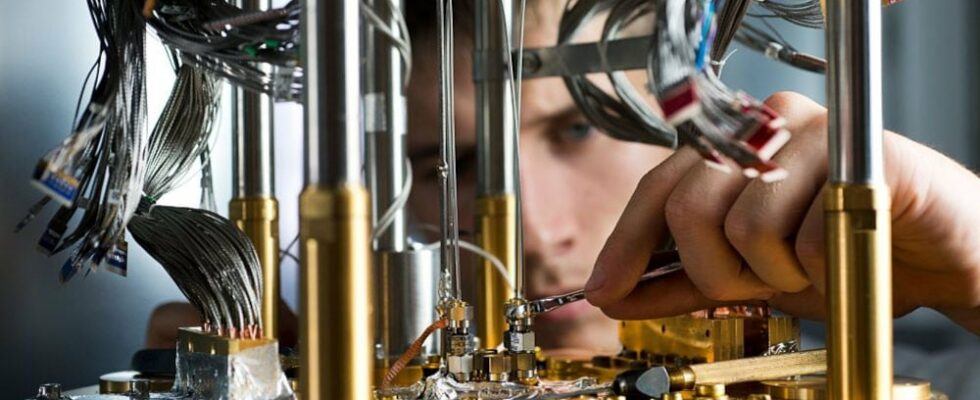Unlike artificial intelligence, whose recent progress is tangible, quantum technologies suffer from a lack of visibility. They are difficult to understand, being based on advanced scientific principles such as the superposition and entanglement of atoms, spins and photons. And although they are promised to revolutionize intensive computing used, among other things, in chemistry, health, or energy, their concrete applications for the general public will probably not see the light of day for several decades. “The adventure we are experiencing at the moment in quantum is comparable to that of the pioneers of computing in the 1950s,” Georges-Olivier Reymond, the company’s boss, told L’Express a year ago. Frenchwoman Pasqal, specialized in the field. In the same way, it seems crucial to position yourself there as early as possible.
In France, the message has been understood, indicates a note from the Montaigne Institute, published this Thursday, October 3. France “is well positioned both scientifically and in terms of exporting its infrastructure and quantum equipment”, observes the think tank, compared to global competitors, primarily the United States. The country was able to “bring to light four of the six most promising quantum technologies: cold atoms [NDLR : parfois évoqués sous l’expression “atomes neutres”]entangled photons, superconductors and spin-silicon systems”.
Pasqal, therefore, co-founded by the Nobel Prize winner in physics Alain Aspect, but also Alice & Bob, Quellela, C12 and Welinq are among the most advanced local startups on these issues. “In terms of marketing its infrastructures and quantum hardware, French players hold 28% of the market share of global quantum infrastructures, mainly concentrated on processors, thus competing directly with American leaders,” writes the Institute. Montaigne. Recent successes: Quandela announced at the beginning of September the upcoming installation of a quantum computer at Exaion, a subsidiary of EDF based in Quebec (Canada). Pasqal, for his part, revealed, last May, the signing of an agreement with the Saudi energy giant, Aramco, to deliver a machine by next year. Contracts worth several million euros, which call for others. The global quantum computing market could amount to $850 billion in 2040, underlines another study published this summer by the American firm BCG (Boston Consulting Group).
A delay in the software
This observation bodes well for a sector with methodical development, which already benefits from its own private investment funds like Quantonation, and notable support from the public sector – both European and French. This is evidenced by the establishment of “Quantum Plane“, in 2021, in which the State has invested one billion euros, or the launch in the spring of the “Proqcima” order program, endowed with 500 million euros. Launched by the General Directorate of armament (DGA), the latter puts five French startups in competition in the design of two hyper-efficient computers by 2030 and 2035. A method inspired by the British “Ultra” project, during the Second World War, which allowed the allies to create in record time a machine for deciphering secret messages sent by the Nazis.
This appetite of France and Europe for infrastructures in the quantum world is welcome. Because in artificial intelligence (AI), it is its weak development at this level which penalizes it. However, there is a downside to the French strategy. The Montaigne Institute deplores “the absence of French players in market segments essential to the construction of a quantum offer with an international vocation, in particular those of middleware and quantum software”. However, these building blocks are essential for “exploiting quantum hardware” and “accelerating its benefits”, BCG also stated. In short: determine where quantum is advantageous compared to so-called “classical” computing (including AI as we currently know it), in order to impose it more easily.
“No French company has, to date, succeeded in marketing quantum development tools, unlike Canadian, Austrian, Israeli or even German players. Of the 85 startups specializing in quantum software created around the world, only five are French, and the latter represent less than 1% of the 1.6 billion dollars invested in this sector globally,” adds the think tank.
“A V2 of the Quantum Plane”
“In truth, no one is very good at the software part, which will rather expand in a second phase, tempers a fine connoisseur of the ecosystem. Quantum OpenAIs will rely, for their applications, on hardware, THE hardware existing. It is therefore a priority to be excellent in this area,” he confides, recalling the case of electronic chip seller Nvidia, whose infrastructures capture most of the revenue generated so far in generative AI. The competition is tough in this segment today, with strong competitors in the ring: the illustrious American company IBM inaugurated its first European quantum data center on Tuesday, in Germany, with the aim of attracting the continent’s industrialists.
In order to stay in the lead, the Institut Montaigne report makes eleven recommendations: better targeting of capital, stimulation of private investment, more public procurement, more European cooperation, more efforts in training of talents (from a young age) and above all, less bureaucracy. “Currently, political responsibility is too diluted, with execution often left to the National Coordination, solely responsible for budgetary decisions. This lack of clarity in roles – between decision, execution and evaluation – is further complicated with the three committees of France 2030 (orientation, monitoring, readability), placing quantum computing among the 30 strategic priorities, unlike the more targeted approaches of the United Kingdom or the United States”, scathes the think tank. “What the sector is waiting for as a priority is a version 2 of the Quantum Plan,” recalls the expert contacted by L’Express. The credits were in fact allocated over five years. A long period, on a political scale. So little, on that of the development of quantum.
.
